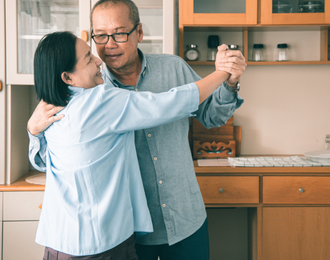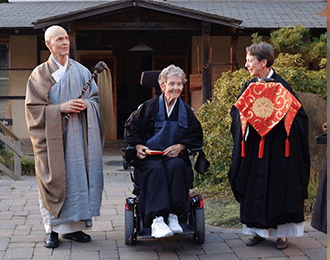Role Reversal: Becoming Your Parent’s Caregiver

Where You Live Matters February 2021
Mom moved in with us a couple of years ago, after Dad died. She needs more help with everyday tasks now and has to be reminded to do some of the basics, like take her medicine or brush her hair. Her vision is getting weaker, and the other day I had to tell her she couldn’t drive anymore. That’s when it hit me – I feel like the mom in our relationship. And it made me unbelievably sad.
Caring for An Aging Parent
Caring for an aging parent can mean handling the kinds of responsibilities that your parent once handled for you. And that can prove challenging for everyone involved.
Melissa Kincheloe, a licensed clinical marriage and family therapist in the Kansas City area, runs a caregiver support group in a local senior living community. Some of the people she works with have experienced this role reversal.
“They’ve had to take over finances, take away driving privileges, make sure the parent is eating, bathing or taking their medications,” she says.
Being a caregiver for a parent can be especially frustrating for the adult children when there is some form of diminished capacity. “Sometimes they have to be the disciplinarian, enforcing what’s best. They’re trying to be reasonable and rationalize the issues, and they’re met with anger and hurt feelings.”
Andrea Harrison lives in Tampa, Florida, and recalls taking care of her uncle, who had Alzheimer’s. “His wife, sons and I had to tell him to take his meds. It was hard to get him to understand that he couldn’t drive anymore. We even had to take the knives out of the drawers so he wouldn’t harm himself,” she says. “Sometimes he got really mad or patronized us and just laughed it off. He could be stubborn and not want to listen.”
Kincheloe says that grief often enters the equation in these situations. “The parents are still living, but the relationship has changed.” And when there’s diminished capacity, it seems like the loved one is leaving them, even when they’re physically present.
Andrea experienced that with her uncle. “We were very close. He was amazing. Charismatic, smart, could talk about anything,” she says. But by the time she got married, the disease was already stealing him away. “At my wedding, we danced,” she says. “He leaned over and asked me, ‘Whose wedding are we at?’ It was heartbreaking, but I didn’t want to upset him. So, I pointed to my husband and said, ‘His wedding.’”
What Can You Do?
For those caring for aging parents or loved ones, it’s common to feel overwhelmed, stressed and guilty. Kincheloe says one of the best things you can do is join a support group.
She says, “It means you can validate your experiences. It’s a relief to know you’re not alone.”
She emphasizes that each situation is different, and there’s not a manual to walk you through this. “Support groups are not about fixing each other’s situations. They’re a place to gather, learn, be honest, share resources and frustrations,” she says. “There is no judgment. It’s a place where you can say anything. It lets you offload your frustrations so you can then be more patient with your loved one.”
She adds that when everything feels out of control, a support group can empower you, improve coping strategies, and even help with depression and anxiety.
Kincheloe also says you need to take care of yourself. “Caregivers get run down and depleted. When that happens, who’s there for your loved one?”
A Different Point of View
Parents will respond to your caregiving efforts in different ways. Andrea’s mother lives with her, her husband and daughter. She sometimes needs reminding to take her medicine with food, or not to give out her personal information to everyone who calls. “I have to remind her of the things she taught me as a kid,” she says. “But there’s no tension, no resentment.”
Kincheloe says not everyone reacts this way. Sometimes parents are compliant, like Andrea’s mother. Sometimes they manifest rage, resentment or defiance. Some are just sad. Others are proactive and make the choice to move to a senior living community as a way to take control of their future and not feel like they’re a burden to the family.
She encourages caregivers to try to see the parent’s experience from their point of view. “If you can see that they’re scared, or don’t understand, or feel trapped, that perspective helps you soften, be more patient, and have more compassion.”
We Can Choose Our Perspective
Andrea’s point of view as a caregiver is simple. “I’m not bitter or resentful. This is how I grew up. I watched my mom take care of my grandfather, and I was a part of it. She set the example. Sometimes her music is too loud, and I have to tell her to turn it down, but I’m blessed she’s a part of our lives.”





